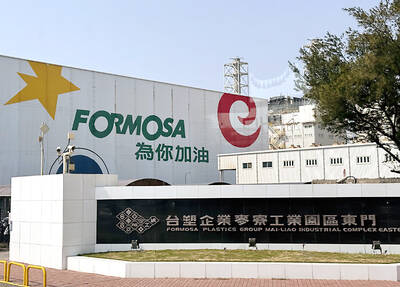The Fair Trade Commission (FTC) yesterday said it is to fine hypermarket chain operator RT-Mart International Ltd (大潤發) NT$3.5 million (US$119,629) for spreading misleading information about a planned toilet paper price hike that led to a sudden imbalance of supply and demand last month.
Some of the nation’s major hypermarket operators, including Carrefour Taiwan (家樂福) and RT-Mart, late last month announced they were informed by toilet paper makers that prices would be raised by up to 30 percent in the middle of this month at the earliest, citing a spike in international pulp prices.
The announcement spurred people to stock up on toilet paper, emptying store shelves.
The commission convened a forum to promote competition and prevent price gouging, which was attended by representatives from three major toilet paper suppliers and five leading hypermarket chains.
The commission on March 1 began a series of meetings with suppliers and retailers to look into the massive run on the product and allegations of price-fixing.
The commission determined that RT-Mart’s misleading announcement violated the Fair Trade Act’s (公平交易法) provisions banning market manipulation.
A probe by the commission found that RT-Mart had issued a statement to media outlets on Feb. 23 announcing the purported price increase ahead of a Feb. 23 to Feb. 27 promotional campaign for toilet paper, FTC Deputy Chairman Perng Shaw-jiin (彭紹瑾) said.
The probe investigated not only whether the price hikes were intentional, but also whether distribution channels conspired with suppliers to cause a price increase, he said.
The commission found that upstream suppliers did not negotiate with RT-Mart on the purported price hike and there is no evidence of a 30 percent price hike, he added.
RT-Mart said it would refrain from talking about the issue until it receives the FTC’s ruling.

EXTRATERRITORIAL REACH: China extended its legal jurisdiction to ban some dual-use goods of Chinese origin from being sold to the US, even by third countries Beijing has set out to extend its domestic laws across international borders with a ban on selling some goods to the US that applies to companies both inside and outside China. The new export control rules are China’s first attempt to replicate the extraterritorial reach of US and European sanctions by covering Chinese products or goods with Chinese parts in them. In an announcement this week, China declared it is banning the sale of dual-use items to the US military and also the export to the US of materials such as gallium and germanium. Companies and people overseas would be subject to

Taiwan Semiconductor Manufacturing Co (TSMC, 台積電) founder Morris Chang (張忠謀) yesterday said that Intel Corp would find itself in the same predicament as it did four years ago if its board does not come up with a core business strategy. Chang made the remarks in response to reporters’ questions about the ailing US chipmaker, once an archrival of TSMC, during a news conference in Taipei for the launch of the second volume of his autobiography. Intel unexpectedly announced the immediate retirement of former chief executive officer Pat Gelsinger last week, ending his nearly four-year tenure and ending his attempts to revive the

WORLD DOMINATION: TSMC’s lead over second-placed Samsung has grown as the latter faces increased Chinese competition and the end of clients’ product life cycles Taiwan Semiconductor Manufacturing Co (TSMC, 台積電) retained the No. 1 title in the global pure-play wafer foundry business in the third quarter of this year, seeing its market share growing to 64.9 percent to leave South Korea’s Samsung Electronics Co, the No. 2 supplier, further behind, Taipei-based TrendForce Corp (集邦科技) said in a report. TSMC posted US$23.53 billion in sales in the July-September period, up 13.0 percent from a quarter earlier, which boosted its market share to 64.9 percent, up from 62.3 percent in the second quarter, the report issued on Monday last week showed. TSMC benefited from the debut of flagship

TENSE TIMES: Formosa Plastics sees uncertainty surrounding the incoming Trump administration in the US, geopolitical tensions and China’s faltering economy Formosa Plastics Group (台塑集團), Taiwan’s largest industrial conglomerate, yesterday posted overall revenue of NT$118.61 billion (US$3.66 billion) for last month, marking a 7.2 percent rise from October, but a 2.5 percent fall from one year earlier. The group has mixed views about its business outlook for the current quarter and beyond, as uncertainty builds over the US power transition and geopolitical tensions. Formosa Plastics Corp (台灣塑膠), a vertically integrated supplier of plastic resins and petrochemicals, reported a monthly uptick of 15.3 percent in its revenue to NT$18.15 billion, as Typhoon Kong-rey postponed partial shipments slated for October and last month, it said. The